At 30 and newlywed, Hassan Isiyaku, * (not real name) 30, anticipated starting a family as soon as possible. Holding his baby in his arms was a feeling he could not wait to experience.
His expectations rose to the highest when his wife’s pregnancy reached nine months. He had bought every item needed for childbirth.
Alas, on D-day, his wife went into labour at 7.00 am on a Thursday. At 4 pm, nine hours later, Isiyaku was still on the premises of Achika Health Post, waiting for news of his wife’s delivery. His palms were sweaty, his heart beat fast, and he was getting impatient.
Then, he heard the shout of “Inna lillahi wa inna ilayhi raji’un”. It meant, “We surely belong to Allah and to Him we shall return”. His hopes were smashed to pieces.
The non-existence of a midwife in Ackika Health Post, the primary healthcare centre (PHC) serving Achika Ward in Wudil Local Government Area (LGA) of Kano State, was the reason Isiyaku lost his first child.
“My wife was in labour for more than eight hours,” he recalls.
“I felt pity for her because I could not but imagine the excruciating pains she passed through during her prolonged labour and having lost the child after eight hours of labour is really terrible. During her pregnancy, I and my wife earnestly prayed for a baby boy and agreed to name him Suleiman but he is no more. Well, Allah knows best but my pain is that my child wouldn’t have died if there was a midwife present in the hospital to attend to her that day.
“That morning, after long trials, I got a midwife whom I paid with my money to help my wife deliver her baby but my efforts were fruitless. Many women in the community prefer to give birth at home and I know that giving birth in a hospital is better than doing it elsewhere but I took my wife to the hospital and it ended in tears. In this community, giving birth in the PHC and at home is not guaranteed and it is disappointing,” Isiyaku narrates in despair.
It has been one year since the death of his child during birth, but the memory is still raw. He and his wife have not thought about having another child yet.
Fatima Yusuf, a staff of the PHC confirms Isiyaku’s ordeal. Isiyaku’s wife could not be referred to another hospital because she was already in labour. The nearest PHC was too far away, and having to put her on a motorcycle was dangerous because the roads were bad.
“Network is also poor here and it was really challenging to get help in a short time. Also, the PHC is ill-equipped as we don’t have enough equipment for deliveries,” says Yusuf.
Waking up to a dead baby
At 40, Halima Dahiru, a resident of Achika, is already a mother of 10 children. Her last child died just 10 minutes after being born. She told this reporter that because Achika PHC lacked midwives and equipment, she opted to give birth at home using local means but the outcome was abysmal.
“I spent two hours in labour and after I gave birth, I had to sleep because the stress and pain were unbearable. That was my 11th delivery so taking a little nap was the only way to relieve me of the pain and stress,” she recalls.
“Upon waking up, I realized the looks on the faces of people around me were dull, and I became curious to know what the matter was. After inquiring, I was told that my child didn’t survive past 10 minutes after I slept because of a complication that arose. It sounded unbelievable till I confirmed it myself.
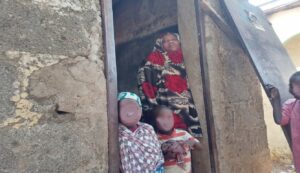
“I cried bitterly after confirming that I lost my baby because carrying that child for nine months wasn’t easy for me at all—and waking up to a dead child pained me to the core. I was really bitter. I pray that the PHC will be equipped as soon as possible so that other women will not pass through what I experienced.”
Infant mortality is also prevalent in Yar Kasuwa community in Gwarzo Ward in Gwarzo LGA where 28-year-old Amina Babangida’s child died from complications after birth.
She had to trek for about an hour to a general hospital in the ward to give birth to her set of twins because Yar Kasuwa PHC is not functional.
“The experience of losing one of my twins wasn’t pleasant and the memory makes me unhappy whenever I remember that incident,” she recalls.
“The doctor said that the long walk to the facility was a reason why one of the twins couldn’t survive due to stress and other complication that arose.
“The death of my child could have been prevented if Yar Kasuwa PHC, which is just opposite my house, was functional but sadly it isn’t and other women like me have to trek a far distance to the general hospital to give birth to their children. I thank Allah that at least I have one of the twins alive.”
Aisha Mohammed, 42, who also lives close to the Yar Kasuwa PHC says she was lucky to have both her twins—Abdulrahman and Saudat—alive, after the harrowing experience she had while trekking to Gwarzo General Hospital to give birth.
“I struggled to walk to the hospital because I was in pain with my bumpy tummy; people on the road pitied me. The fact that everyone on the road was pitying and condoling me spoilt my mood that morning.
Apart from the twins, Mohammed has 10 other children, all born in health facilities.
“But the recent delivery made me scared because I thought I would lose my twins but I thank Allah that I didn’t. If this PHC was functional, other women like me will not have to trek to the general hospital to give birth to their babies,” she says.
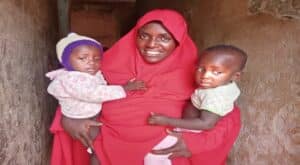
Aliyu Ya’u, the officer-in-charge of Yar Kasuwa PHC says the reason women have to trek long distances to the nearby general hospital to give birth is because the PHC does not have facilities and staff to cater for midwife services. It neither receives money for midwives nor has any midwives on its staff.
Giving birth at home a norm
Like in Achika, women in Doka community of Tofa LGA opt to give birth at home, while a few do so at the General Hospital in Tofa Ward.
Sa’adatu Lawan, 30, and two of her neighbours who reside close to Doka are part of the population with a preference for delivery at home, not minding possible risks.
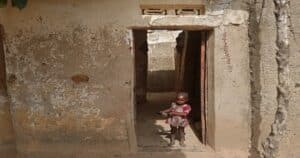
In this household, the women have a total of 16 children among them and only two children were born in a health facility; the remaining 14 were born at home with the aid of a traditional birth attendant, in spite of the fact that Doka PHC is just some 100 meters from their residence.
Sa’adatu has seven children, all born at home.
“I can remember a period when I was heavily pregnant and went for antenatal at the PHC. I was told to get my ‘mama kit’ because I was on the verge of giving birth. Immediately I got to the house, my baby had already started coming out, so I was delivered at home,” she says.
“Afterwards, I went to the PHC for checkup and other necessary attention I may need. Doka PHC does not have adequate delivery equipment and, most times, women are referred to a General Hospital in Tofa which is why I delivered all seven of my children at home,” Sa’adatu says.
Sa’adatu’s neighbours agree. Speaking anonymously in a focus group discussion, they said the lack of delivery equipment and inconsistent closing hours of the PHC makes other women like them in Doka deliver at home. They also called on the PHC’s management to ensure that the facility has a stable closing time and operates at night.
The officer-in-charge of Doka PHC, Abdulkadir Sani, says the reason some women are apprehensive about giving birth in the facility is because the PHC does not run a 24-hour service because it is short on manpower.
“We close at 4.00 pm and we also don’t have a midwife in this facility although we have community health extension workers,” Sani says.
“We are making plans to increase the manpower and also ensure that we run two shifts so that women can deliver in this facility whenever they come.”
Sani maintains the facility accepts deliveries. However, when this reporter checked the maternity ward of the PHC, some of the equipment and beds were covered in dust, suggesting that they were out of use.
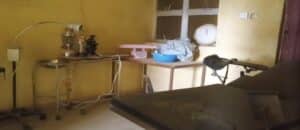
For 25-year-old Husaila Ado, a mother of five who resides in Imawa community, Warawa LGA, giving birth at home is a norm, because her mother and other relatives did same.
“I am aware that giving birth in a health facility is better because the personnel are more skilled and experienced than local birth attendants but since I gave birth to five of my children at home without problems, I think I don’t have any issue,” she says.
Through five pregnancies, she attended antenatal clinic and did not give birth in a health facility.
“Delivering at home is a normal thing for me and I thank God that all my deliveries were safe and sound and I don’t pray for any complication in the future,” she says.
“If there were midwives in this facility [Imawa Health Post] I would not mind giving birth to my children there but since there are none, I can’t travel long distances to deliver since I can easily do it at home. I look forward to the time when there will be midwives in the facility.”
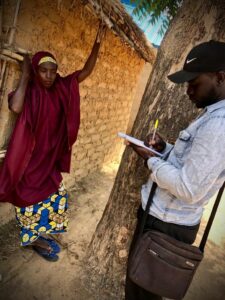
Women who deliver at home without complications, only lucky – Expert
Gynaecologist and obstetrician, Dr Habib Sadauki, says women who give birth at home without complications are only lucky, as the risks to home delivery are severe.
“For instance, when a woman delivers a baby that does not cry, there is certainly a problem and that baby could possibly die and even if it survives, could have brain damage if the baby does not cry within 5 minutes of birth. In a well-equipped health facility, there are things that the doctors will do to salvage the situation and save the baby but those without that knowledge can’t,” explains Sadauki, president of the Society of Gynecology and Obstetrics of Nigeria (SOGON).
Dr Habib also points out that the fact that Husaila and Sa’adatu gave birth to all their children at home without having issues wasn’t because the process they followed for delivery was proper.
“They were only lucky that complications didn’t arise during or after delivery,” he insists.
“The home environment is often not clean enough and absolutely not safe for deliveries. If serious complications like postnatal haemorrhage arise, it simply means that either the mother, child or both may lose their lives before getting proper medical attention in a health facility. Postnatal haemorrhage is unpredictable and can happen in any woman.”
The Midwives Service Scheme (MSS), established by the federal government to aid in addressing maternal and infant mortality was created in December 2009 to serve rural areas of Nigeria. It is an effort to tackle the paucity of skilled obstetric care providers and poor access to basic emergency obstetric care by hiring and deploying newly qualified, unemployed, and retired midwives and equipping facilities to provide elementary emergency obstetric care.
Data from the Kano State Primary Healthcare management board (KSPHCMB) shows that the state has a total of 165 permanent and pensionable midwives and nurses for the 1,200 PHCs across the state.
The number of temporary or contract midwives is uncertain. Multiple sources say the government is still in the recruitment process of those contract staff to augment the insufficient number of midwives in the state.
Transitional issues caused MSS collapse – Kano Ministry of Health
In Kano, the MSS collapsed on account of what is being termed “transitional issues”, according to Idris Zubairu, the Director of Nursing Services at the Kano State Ministry of Health.
The issues include concerns over the sustainability of the scheme, the federal government’s inconsistency in funding, delay in the absorption of the midwives into the scheme.
“At the period when the scheme was active in Kano, the rate of maternal and child mortality drastically reduced to a reasonable rate in the state because there was a quick response, availability of drugs and other services that were needed to ameliorate MNH [maternal, newborn and child] mortality and the level of delivery at home using TBAs [traditional birth attendants] was drastically reduced,” Zubairu adds.
Although statistics show that the maternal mortality rate between 2016 and 2017 stood at 1,025 deaths per 100,000 live births and the child mortality rate stood at 103/1,000 live births, one of the highest in Nigeria.
Between 2016 and 2018, neonatal mortality reduced from 69 to 37 deaths per 1,000 live births, post-neonatal mortality fell from 44 to 26 per 1,000 live births, and infant mortality dropped from 112 to 62 per 1,000 live births, according to data from MICS 2016 and the NDHS 2018.
“Due to the growing population and restricted number of midwives to be trained by the regulatory bodies, we cannot meet up with the standard requirement because these schools are regulated by the nursing and midwifery council of Nigeria,” he explains.
That did not help Isiyaku more than a year ago. The hope is that when Isiyaku and his wife find the courage to try again for another child, a midwife will be closer and available when it is time for their child to be born.
Efforts made to speak with the management of the Kano State Primary Healthcare Management Board (KSPHCMB) proved abortive at the time of filing this report as this reporter was tossed around offices and officials. No response was forthcoming. When this reporter requested an interview with the Executive Secretary of the KSPHCMB Dr Tijjani Hussaini after several attempts, he declined saying, “I’m sorry, I cannot respond to any questions.”
This report is supported by the International Budget Partnership, IBP, and the International Center for Investigation Reporting, ICIR.


